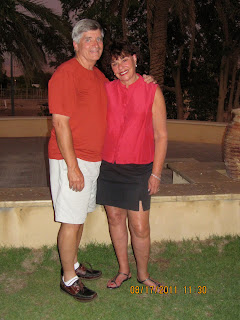There are no fish or any kind of swimming, squirming creatures living in or near the water. There are, however, several types of bacteria and one type of algea that have adapted to harsh life in the waters of the Dead Sea. What you'll see on the shores of the Sea is white, crystals of salt covering EVERYTHING. And this
is no ordinary table salt, either. The salts found in the Dead Sea aremineral salts, just like you find in the oceans of the world, only in extreme concentrations. The water in the Dead Sea is deadly to most living things. Fish accidentally swimming into the waters from one of the several freshwater streams that feed the Sea are killed instantly, their bodies quickly coated with a preserving layer of salt crystals and then tossed onto shore.
is no ordinary table salt, either. The salts found in the Dead Sea aremineral salts, just like you find in the oceans of the world, only in extreme concentrations. The water in the Dead Sea is deadly to most living things. Fish accidentally swimming into the waters from one of the several freshwater streams that feed the Sea are killed instantly, their bodies quickly coated with a preserving layer of salt crystals and then tossed onto shore.
Unfortunately Bruce gave me the responsibility of taking his picture floating in the Dead Sea and believe me when I tell you the only reason you would float in the Dead Sea is for the picture. Hopefully someone else in our group took a better picture than I did!
We arrived at the Kibbutz late in the afternoon and it was 105 degrees - but as everyone says it is dry heat ! but I can tell you for sure that is was very warm - we are staying in guest houses and there is air conditioning! - In the evening was a pre wedding bbq - delicious!!! The bride and groom were thrown in the pool - and we are relaxed and got to bed early!
The name of the Kibbutz is Kibbutz Ketura which was founded by a small group of young North Americans, graduates of the Young Judaea Year-In-Israel Course, at the close of the Yom Kippur War in November 1973. The first years of the kibbutz's existence were marked by great difficulties and frustrations, leading many of the founders to leave. In time, the core group of these who remained were joined by other Young Judaeans, a variety of immigrants, and graduates of the Israeli Scout movement. As Ketura grew, a more stable lifestyle was created, and the members began raising families in this, their new home. Today, Ketura has grown to be the second largest settlement in the region, with 140 members and candidates and over 147 children. One-third of the members are native Israelis; the majority of the immigrants come from English-speaking countries, with a smaller number from Europe and the former USSR.



It's been a pleasure following your trip. We found the history and photos of your trip to be quite interesting. Wishing you a safe voyage home!
ReplyDeleteVickie and Karen
Two great pictures: Marilyn, the one of Bruce 'floating' on his back is probably as clear as I would want it to be! The picture of the two of you clearly demonstrates the contributing factor to your trip being a wonderful adventure - the genuine pleasure of each other's company. Continued safe travels and keep on posting! Marc and Ellen
ReplyDelete